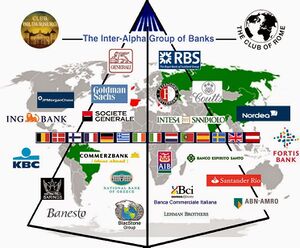Inter-Alpha Group of Banks
(Cartel, Bank) | |
|---|---|
 | |
| Formation | 1971 |
| Founder | |
| Headquarters | |
| Membership | • AIB Group • Novo Banco • Commerzbank • ING Group • Intesa Sanpaolo • KBC Bank • Nordea • National Bank of Greece (not the central bank) • NatWest Group • Santander • Société Générale (France) • Kredietbank • Nederlandsche Middenstandsbank • Privatbanken • Credit Commercial de France • Banco Ambrosiano • Royal Bank of Scotland • BHF Bank |
| A banking cartel created in 1971 by six banks in the European Community, directed from London by Sir Jacob Rothschild | |
The Inter-Alpha Group of Banks is a banking cartel created in 1971 by six banks in the European Community, directed from London by Sir Jacob Rothschild. The group can trace its roots to the later stages of World War 2.[1]
Officially, it is one to provide a platform for the regular exchange of ideas and to explore areas for cooperation between its member banks. The group is a non-hierarchical association and is maintained by mutual agreement with each bank retaining full autonomy and independence. The Inter-Alpha Banking School is held annually in Fountainbleau outside Paris, where members of staff meet.[2]
Jacob Rothschild explicitly revealed the mission of the Inter-Alpha project, in a speech in 1983, when he bragged that "two broad types of giant institutions, the worldwide financial service company and the international commercial bank with a global trading competence, may converge to form the ultimate, all-powerful, many-headed financial conglomerate."[3]
Some researchers go even further. Lyndon LaRouche wrote[3]:
The Inter-Alpha Group of Banks is an instrument of genocide. It was formed for the explicit purpose of destroying not only the existence, but the very concept, of national sovereignty — with the United States as its primary target — as a way of permanently reducing the population of the planet. The Inter-Alpha Group has played a crucial role in the destruction of the industrial base of the United States, and the subsequent transformation of our economy into a giant, and hopelessly bankrupt, casino.
Despite the enormous wealth these banks represented, they alone did not have the funds required to transform the world as planned. They would provide the seed money, and leverage their power through the control of other people's money, to create the markets and institutions they would ultimately need to control the world. This is the origin of today's gaggle of hedge funds, private equity funds, and related financial pools, many of which are part of the hidden side of the Inter-Alpha Group.[3]
Function
The group's function has evolved to:
- Provide a platform for the regular exchange of ideas at the executive and senior management level
- Allow specialists to meet and discuss topics of particular interest
- Establish areas of cooperation, particularly in international trade
- Train bank management through annual Inter-Alpha Banking School and annual Inter-Alpha Banking Management Programme at INSEAD at Fontainebleau near Paris
- Create a framework for individual banks within the Group to work together
Members
Each of its six members was chosen to represent a bank in one of the principal nations of the European Economic Community: Kredietbank, of Belgium; Nederlandsche Middenstandsbank of the Netherlands; Credit Commercial de France; Banco Ambrosiano, of Italy; Williams & Glyn's Bank (a unit of the Royal Bank of Scotland), in the U.K.; and BHF Bank, of Germany. A seventh bank, Privatbanken, of Denmark, was added in 1972. Its more recent membership include eleven banks, representing 15 European countries:
- AIB Group, Ireland
- Novo Banco, Portugal
- Commerzbank, Germany
- ING Group, Netherlands
- Intesa Sanpaolo, Italy
- Kredietbank, Belgium
- Nordea, Norway, Denmark, Finland and Sweden
- National Bank of Greece, Greece
- NatWest Group, UK (via Williams & Glyn's Bank)
- Santander, Spain
- Société Générale, France
Known members
3 of the 18 of the members already have pages here:
| Member | Description |
|---|---|
| Banco Ambrosiano | A bank connected to P2, no doubt used for various illicit purposes. |
| ING | Dutch multinational bank. |
| Nordea | Swedish bank |
Rating